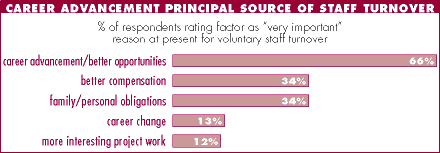
Staff turnover is declining; most voluntary moves for career advancement

Work-on-the-Boards Survey
by Kermit Baker, PhD, Hon. AIA
AIA Chief Economist
 May
was the third straight month that U.S. architecture firms have been able
to avoid a downturn in billings. This three-month winning streak comes
after six straight monthly declines in billings. The upturn in business
activity at firms apparently is the result of a sharp increase in inquiries
for new projects earlier this year. Inquiries rose sharply during the
first quarter this year, and for many firms these inquiries have translated
into new projects. Inquiries have settled back a bit in recent months,
although they still are at very favorable levels.
May
was the third straight month that U.S. architecture firms have been able
to avoid a downturn in billings. This three-month winning streak comes
after six straight monthly declines in billings. The upturn in business
activity at firms apparently is the result of a sharp increase in inquiries
for new projects earlier this year. Inquiries rose sharply during the
first quarter this year, and for many firms these inquiries have translated
into new projects. Inquiries have settled back a bit in recent months,
although they still are at very favorable levels.
Firms in most regions have seen a marked improvement in billings in recent months. Firms in the Northeast continue to report strong growth in billings. Firms in the Midwest and South report a less pronounced but steady improvement. Firms in the West are still reporting declines, although the declines have moderated substantially in recent months.

Residential quiets
down; nonres still waiting for rebound
Residential firms, who had reported the most favorable business conditions
in recent months, are now not quite so upbeat. They reported flat billings
in May, and only a modest increase in inquiries. Commercial/industrial
firms, as well as firms with a mixed practice, reported flat billings
but a sharp increase in inquiries. Institutional firms reported a strong
increase in billings in May, and a modest increase in inquiries.
While architecture firms are reporting improvement in business conditions, nonresidential construction activity has yet to see this rebound. F.W. Dodge recently reported that while nonresidential construction contracts increased 3% in April, they are down 13% through the first four months of the year. The institutional sector continues to perform very well, according to Dodge, paced by the strong activity for school construction. And although offices and retail projects performed well in April, the trend is still down for both of these sectors.
Voluntary turnover
is slowing
With both the economy and the construction sector having dipped over the
past year, voluntary staff turnover would be expected to have slowed.
Fewer than one in five firms in this month's survey report that voluntary
turnover has increased over the past year. Over half report that it has
remained the same, while just fewer than 30% note that turnover has decreased.

Career advancement, or better career opportunities, is the top-rated reason for voluntary turnover. Two thirds of firms rated this reason very important. About a third of firms rated better compensation or family or personal obligations as a very important reason for turnover. Only about one in eight firms rated desire for a career change or desire for more interesting work as a very important reason for staff turnover.
Larger firms were more likely to cite career advancement/better opportunities and seeking more interesting project work as very important reasons for voluntary staff turnover. Almost three-quarters of firms with $1 million or more in annual billings cited career advancement as a key reason for turnover, as compared to just over half of firms with billings under $1 million.
Smaller firms, alternatively, more commonly cited better compensation as a reason for turnover. Almost half of firms with billings under $1 million felt that better compensation was a very important reason for turnover, compared to fewer that a quarter of firms with billings in excess of $1 million.
Copyright 2002 The American Institute of Architects. All rights reserved.
![]()
|
|
|